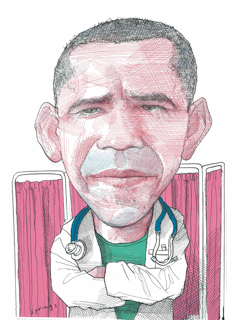
During the 2008 primary campaigns, there was a constant muted roar telling Barack Obama to become more aggressive, to answer wild allegations against him, to “stand up to” Hillary Clinton or his other rivals. He rightly saw that would boomerang against him. The last thing he could appear was an angry black man. Harry Reid, with his derided comments in the book Game Change, was basically right. It was helpful that Obama, the first black man with a realistic chance at the presidency, was lighter skinned and better spoken than, say, an Al Sharpton or Jesse Jackson. He was the anti-Sharpton, not railing against American racism. He was more a Sidney Poitier than a Shirley Chisholm.
He was hopeful, optimistic, patriotic—all necessary qualities in the mold-breaker; he was soothing, not threatening. He promised to unite red and blue states, to end a period of bitter divisiveness in Washington. To many it mattered more that he was the anti-Bush than that he was the anti-Sharpton. A policy of omnidirectional placation had served him well as the editor of the Harvard Law Review, as a community organizer, as a state senator. But the mild manner works only if it removes the threat from a serious purpose. In the presidency, Obama has let the mild manner become the purpose. And with the loss of the Massachusetts Senate race, that purpose—and his ability to act on it—has been put in deep doubt.
In a sense, he swallowed his own Kool-Aid. He worked on the unrealistic assumption that his really was a post-racial, post-partisan, post-red-state-blue-state America. He spent a year and endless energy in trying to please and recruit the Olympia Snowes and Charles Grassleys and Max Baucuses and Big Pharmacies. He let them dictate the pace and the terms of the health care debate, making it hostage to the virulent town hall meetings of the summer of 2009. They were never going to be his allies. He should have identified them as his foes early on, and attacked them as such.
Instead of saying he would let others give him a health plan, any health plan, he should have said that the health plan he needed and wanted was the public option, and then sold it unceasingly as the only means of bringing down costs—which proved to be the central issue in rejecting less effective compromises. He should have used the stick, not endless carrots, on the blue dogs. He should have recognized that he must get results fast, while he was riding high in the polls. Lyndon Johnson said that if a man comes into office with one thing he wants, he should get it in his first six months. Obama frittered away his striking time.
On foreign policy, though he came to national prominence as a critic of the Iraq war he appointed a secretary of state who had voted for it, a vice president who had voted for it, a secretary of defense who had supported it, and top echelon generals who had waged it. As if to placate them, he substituted a new dumb war for the old dumb one. He has tied down our troops, money, and resources to one government (not really a government) when terrorism has metastasized across many governments and nations—limiting our response to it by the feckless hope of building a viable nation in Afghanistan. He choreographed a great series of listening sessions, where every general had his say in the White House before he tried to please them all. On one of George Bush’s worst excesses, his signing statements nullifying congressional legislation, Obama has substituted a worse recourse, secret signing reservations—allowing him to bypass certain provisions of a bill—that are hard to trace.
He has put off decisions on rendition, on Guantanamo, on CIA interrogation. As if he felt restrained by his own blackness, he will not fight, though the American people love a fighter—Teddy Roosevelt going after the trusts, Franklin Roosevelt mocking the “malefactors of great wealth,” Harry Truman for “giving ‘em hell,” attacking the Do-Nothing Congress and his media foes. Whatever their other faults, Richard Nixon and George W. Bush were applauded when they proved to be fighters. Bush was never apologetic about playing to his base, while Obama has acted as if he were ashamed of his. They are repaying him in kind.
During his campaign, Obama’s critics called him a hope-addict, all rosy scenarios and Let’s-get-along and Kumbaya. It is sad to realize, at last, that they were right. Hope did him in.


